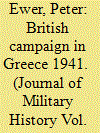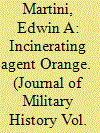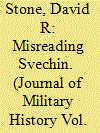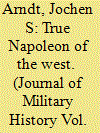|
|
|
Sort Order |
|
|
|
Items / Page
|
|
|
|
|
|
|
| Srl | Item |
| 1 |
ID:
116786


|
|
|
|
|
| Publication |
2012.
|
| Summary/Abstract |
This article looks afresh at the decision by Britain to despatch an expeditionary force to Greece in 1941 to oppose the much-anticipated decision by Hitler, to end by German invasion the inept Italian campaign against Athens. The existing work on this topic emphasises the geo-political motives behind the campaign, especially Churchill's need to impress American public opinion by going to the aid of the Greeks, often with an assumption that British military leaders committed themselves to the venture against their better judgement. What these accounts overlook is what British planners thought was operationally possible. This article is based on new archival research, which indicates that key British leaders, throughout the chain of command, thought Greek topography would prevent the Wehrmacht from repeating the success of armoured warfare achieved by the Germans in France. In considering this material, the article sheds new light on the failure of British military leaders to fully understand the possibilities of armoured warfare, and thus adds to our understanding of the doctrinal reasons for poor British battlefield performance in the 1940-42 period more generally.
|
|
|
|
|
|
|
|
|
|
|
|
|
|
|
|
| 2 |
ID:
116789


|
|
|
|
|
| Publication |
2012.
|
| Summary/Abstract |
This paper describes the origins of the covert paramilitary function in the Central Intelligence Agency (CIA) and the challenges to the effectiveness of paramilitary operations during the Cold War's first decade. This capability did not develop by design or initiative on the Agency's part but was assigned to it. The thirty-month gap between the dissolution of CIA's wartime predecessor, the Office of Strategic Services, and the assignment of the paramilitary function to CIA in mid-1948, as well as other self-inflicted causes, may help explain why CIA's paramilitary activities in the 1950s never were as effective as policy makers and Agency operations officers expected.
|
|
|
|
|
|
|
|
|
|
|
|
|
|
|
|
| 3 |
ID:
116790


|
|
|
|
|
| Publication |
2012.
|
| Summary/Abstract |
Most studies of the herbicide Agent Orange focus on its use in the Vietnam War or its long-term consequences. Lost is the story of the 2.4 million gallons of Agent Orange still in the U.S. military's possession after its use was banned in 1971. The U.S. Air Force addressed this surplus supply during Operations Pacer IVY and Pacer HO, navigating challenges ranging from the growing environmental movement to new government bureaucracies devoted to environmental protection. This essay seeks to help fill a gap in Agent Orange scholarship and add to the literature on the intersections of military and environmental history.
|
|
|
|
|
|
|
|
|
|
|
|
|
|
|
|
| 4 |
ID:
116784


|
|
|
|
|
| Publication |
2012.
|
| Summary/Abstract |
Soviet military theorist Aleksandr Svechin is often misperceived as an advocate of strategies of attrition over destruction or annihilation. In fact, Svechin was an historicist, who saw the precise balance between attrition and annihilation, or defense and offense, as constantly shifting as a result of changing material circumstances. A close examination of his theoretical and historical works reveals the depth of his thinking, while his response to Russia's 1916 Brusilov Offensive shows his support for ambitious strategies of annihilation under the proper circumstances.
|
|
|
|
|
|
|
|
|
|
|
|
|
|
|
|
| 5 |
ID:
116785


|
|
|
|
|
| Publication |
2012.
|
| Summary/Abstract |
The battle of Caporetto in October-November 1917, one of the most catastrophic defeats administered to any army during the First World War, continues to stir lively debate nearly one hundred years later. While analysts then and for some time after blamed the debacle on soldier defeatism, historians today find the reasons in the Italian Army's tactical, logistical, and strategic shortcomings. Perhaps the most intriguing question before historians of the event today is why the general officer most responsible for the catastrophe not only managed to evade being charged for his failures but instead ended up as the Chief of Staff of the Italian Army. That is the subject of this article.
|
|
|
|
|
|
|
|
|
|
|
|
|
|
|
|
| 6 |
ID:
116787


|
|
|
|
|
| Publication |
2012.
|
| Summary/Abstract |
Despite the importance of the German invasion of Greece in 1941, relatively little research has been conducted into the campaign's operational aspects, and a number of misunderstandings or misinterpretations have developed. One of the most powerful misconceptions was that the huge disparity in airpower, particularly dive-bombers, made it impossible for British and Dominion troops to hold the German advance. This article demonstrates, however, that despite its complete dominance of the Greek skies, the terror it inspired, and its almost continual operations against Allied positions, the Luftwaffe did not have the decisive role in the campaign that has so often been ascribed to it.
|
|
|
|
|
|
|
|
|
|
|
|
|
|
|
|
| 7 |
ID:
116783


|
|
|
|
|
| Publication |
2012.
|
| Summary/Abstract |
Combined-arms combat divisions emerged fully during the French Revolutionary Wars in the late 1700s. This paper explores how U.S. General Winfield Scott's Mexico City campaign (9 March-14 September 1847) contributed to this military innovation's transatlantic diffusion. It argues that Scott organized the Army of Invasion of Mexico according to the French system of combined-arms divisions, enabling him to replicate the Napoleonic era's aggressive operational tactics. In this way, Scott nullified the Mexican forces' numerical superiority, overcame their fortified defensive positions, and gradually annihilated them, strengthening his claim to be the "Napoleon of the West" and demonstrating that combined-arms divisions were appropriate for the American way of war.
|
|
|
|
|
|
|
|
|
|
|
|
|
|
|
|
|
|
|
|
|